

USE MENU ABOVE TO VIEW MORE IN THIS SERIES
Despite the candlelit countertop memorial inside the entrance, customers often asked "Where's Corey?" that fall as they swept past the empty first chair.
It was left to Barry Sonenthal, the shop's veteran barber, to break the news again and again and again.
For all of Sonenthal's boundless gift of gab, there was no way to announce Corey Hindes' death gently. But he would try. He would start by making the sign of the cross as thoughtfully as a Jew could make it.
"Do you know what that means?" he would ask, hoping that would be word enough.
For some, it would be; for others, not. The shock translated either to silence or to testimonials. And to questions. Most wanted details. "Was he wearing a helmet?" so many asked. And then the omnipresent question only a few were audacious enough to raise: What was to become of the shop?
Those awkward exchanges took place for the most part more than a year ago, during the final months of 2016 following Corey's death in a motorcycle crash that September.
A year and a half later, Patty Hindes spends her Saturdays in the shop, reading. cheering the barbers, chatting up customers, directing traffic, handling the register, concocting business ideas, hanging out.
Still bound by grief, she relentlessly scrubs floors, dusts furniture, wipes down mirrors -- consumed by what she calls "my cleaning therapy."
The loss of a spouse is more than the loss of a soul mate, as overwhelming as that separation alone can be. It's also the addition of his or her half of the responsibilities. They could be the bills or the cooking or the cleaning or the shopping or the driving or the fixing or the planning. They could be as seemingly trivial as who wrote out the birthday cards or who figured out how to operate the TV remote.
They are all the roles that an unspoken contract assigned predominantly to the other partner. They are rituals that now become reminders as well as adjustments, that generate anxiety as well as new skills.
Among the new responsibilities in Patty's care: taking on a business that had been her husband's passion. Without any outside whisper of expectation beyond her own, widowhood handed down to Patty obligations both to carrying on his legacy and to mastering the mechanics of it, to the sense of mission but also to its execution.
"I admire her because she's making a go of it," longtime customer Wayne Arendt says. "It's a whole new experience for her compared to her real job."
A year and a half later, the barbershop outwardly looks little different. The same classic rock radio station plays as background to conversation. The same framed sports art dominates the walls. The latest editions of the same newspaper and magazines Corey had favored sit stacked near the waiting-area sofas. Only a few curios of barbering, motorcycling and Corey have been added to the display case he had installed near the entrance.
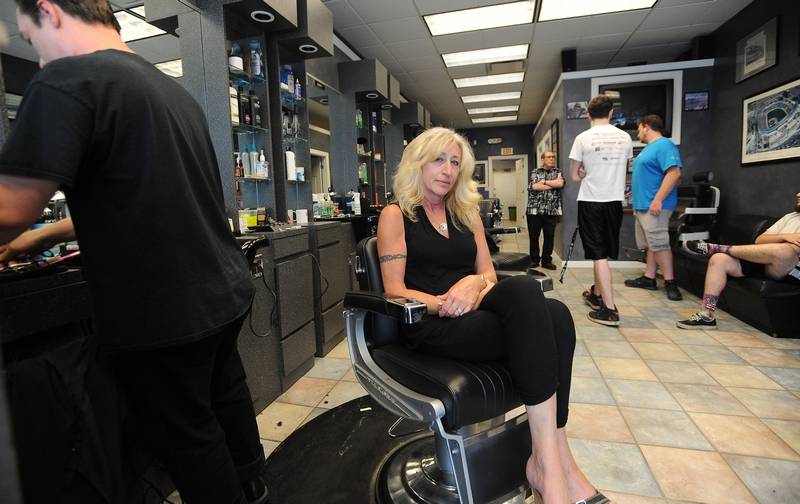
Mark Welsh | mwelsh@dailyherald.com
Patty Hindes in the Arlington Heights barbershop her late husband Corey operated for a quarter of a century.
The broad American flag that Corey had rushed home after 9/11 to pull out of his garage; that in a defiant response to terror, he had hurried back to mount as a featured display on the wall above the register; that had gone up during a week that, until the planes exploded into the towers, was to have celebrated with festive balloons his new location's grand opening, a week that was to have celebrated his greatest entrepreneurial risk and achievement, to have celebrated his belief in the future -- that flag, that artifact of his devotions, still hangs resolutely in the same place, too.
The shop had always been comfortable and old-school, but inconspicuous. Arlington Heights code prohibits the traditional swirling red, white and blue barber poles, so Corey's North Arlington Barber Shop makes do with pole decals on the window and three antique poles that exhibit sideways inside a display case as romantic testament to the millennia-old profession of shaving beards and cutting hair.
The shop is tucked inside the east wing of the boomerang-shaped Arlington Plaza strip mall on the north side of Rand Road just west of Arlington Heights Road, but the interior maintains a glimmer of vintage Americana, slightly larger and brighter perhaps but still the kind of barbershop you'd stumble across along the cobblestone of a small and quaint downtown.
So little has changed. But so much has.
Two of the three barbers who had been a part of Corey's team have since left to open a competing shop down the road, taking many of their clients with them.
Of the group that cut hair for Corey on his last day, only Sonenthal remains. He's been there too long to turn his back now on Corey's memory or on Corey's family or for that matter, on himself. While he has no ownership stake, the shop has been his life's work too.
Two more barbers have been added: Trevor Jordan, a craftsman with a license to do shaves; he's a self-described "quiet operator" not given to ready conversation, but his conspicuous skill with clippers and a straight razor makes him a commanding presence at first chair. And Asha Adderley, an experienced hair stylist with an inclination for sentimentality; upbeat and team-oriented, she used to work at a nearby cosmetology shop but got to know Patty while encouraging her, without success, to try a support group at Willow Creek Community Church in South Barrington.
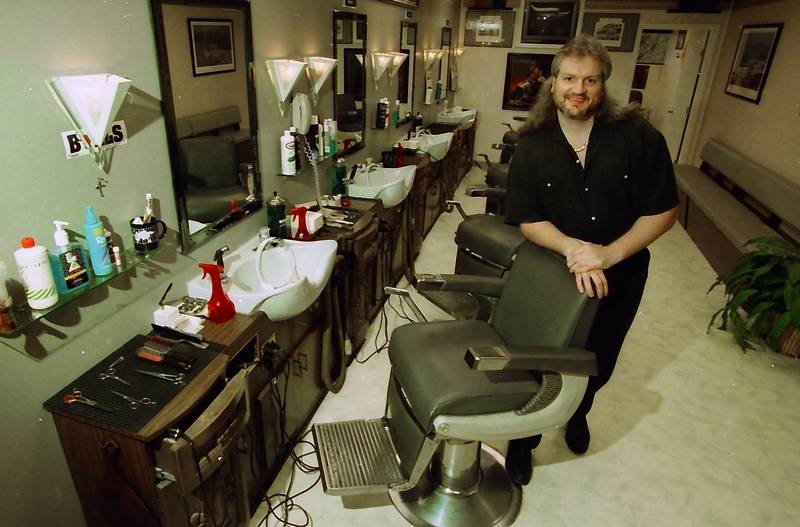
Daily Herald File Photo, 1997
Corey Hindes, at his barbershop when it was located on the second floor of the Northpoint Shopping Center in Arlington Heights.
In the wings: Connor Hindes, the Gen Z son who two years ago had disdained the idea of becoming a barber, now attending barber college. He is the barber-, and eventually the shop owner-, in-waiting, the potential magnet for a younger clientele -- and for his mother's deliverance.
"It was such a relief," Patty says, "when Connor said he was going to go to barber school and that he enjoyed it."
Obligation? At age 19, any duty Connor feels is less to his mother than it is to his father.
"He lived for this shop," Connor says. "He did everything for this shop. This place. It's his blood and sweat. I'm not going to let it go."
Patty Hindes was no barber. She was a 51-year-old software engineer, mother and wife. Smart. Corey always bragged on how brilliant she was. But before he died, her involvement with the barbershop was largely limited to helping with the books and listening to Corey's stories.
Then suddenly in a suburban hospital emergency room on an early Sunday night, her husband Corey and all his bubbling love and contagious confidence were gone. She was too swallowed by devastation to give the shop much immediate thought.
But no thought was needed for the decision that mattered most to its future.
She had no idea what she would do, but as if by impulse, she knew what she would not do: She would not close the shop if there were any power on earth she could bring to save it.
His life's work would not die with him. The shop would stay open. That much Patty Hindes was resolved to see through.
"To think about selling it, to think about getting rid of it, the thing Corey loved his whole life, the thing he lived for -- the thought of getting rid of it terrified me," she says. "It would be like getting rid of him."
In her grief and longing, Patty found many allies in this quest. Barry Sonenthal was among the first.
He'd worked at the shop for more than 30 years, cutting Corey's hair for most of them. Both were fixtures from the younger days long ago even before Corey bought the business, since back when the shop was concealed below street level next to a bank at the Northpoint Shopping Center on the other side of Arlington Heights Road.
It was a Monday when Sonenthal got the news -- a clear and warm late morning, Sept. 19, 2016.
Mondays were always the Sundays of the barbers' weekend, the second day off before returning to a shop that kept Tuesday-through-Saturday hours, and on that Monday, Sonenthal was fidgeting with his cellphone in a dermatologist's waiting room in Buffalo Grove when it rang.
Patty's name flashed up from the device at him. When he answered, another voice was on the call.
"Can you talk?" asked Colette Celaya, one of Patty's dearest friends. "Corey was in a terrible accident."
There was a pause.
"He didn't make it."
Sonenthal sat stunned.
"Patty wants you to tell the others," Celaya said.
He finished his appointment in a daze and then drove to Patty's house in Arlington Heights to express his condolences.
"You don't see this coming," Sonenthal says. "You don't know how you're going to respond."
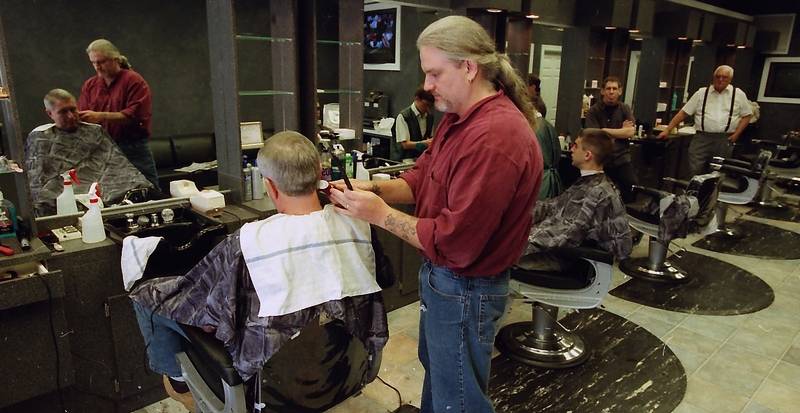
Daily Herald File Photo, 2001
Corey Hindes, at his barbershop shortly after he moved it to the Arlington Plaza where it is today at 130 E. Rand Road, Arlington Heights.
Once he arrived at the house, he walked through the garage, past remnant barber's chairs and Corey's prized Harley-Davidson Heritage Springer, to enter through an interior door.
Celaya greeted him with a hug. She and a few others were gathered around the family room. The atmosphere was one of disbelief. Not a lot was spoken. Patty frequently broke into tears.
At one point she told Sonenthal, "I don't know what to do at the shop."
"Don't worry about the shop," he assured her. "That's the least of your concerns."
By the time he left about an hour later, it was midafternoon. Clouds had formed outside. He drove to his home in Wheeling and ferreted out three 9-by-12 poster boards.
"This shop is closed temporarily due to death in the family," he wrote with a marking pen.
He headed with his signs to the shop, where he found that a customer had placed a wreath with flowers at the door.
Inside, Sonenthal took note of the chair and the hair gels and tonics meticulously organized at Corey's station but didn't linger on them. He put the signs in the windows, double locked the doors and drove home in silence.
Sonenthal is a stoic and pensive man. He articulates feelings but it is with a detachment as if he is observing them; he seldom shows them.
"I didn't sleep that night," he remembers. "I kept getting up. It wasn't real."
The shop stayed dark the next day, a Tuesday. Its moment of silence lasted 24 hours. On Wednesday, it reopened for business with a gaping empty first chair.
At Corey's wake a week later, friends and customers arrived in a long wave that swelled and ebbed but seemed to never end.
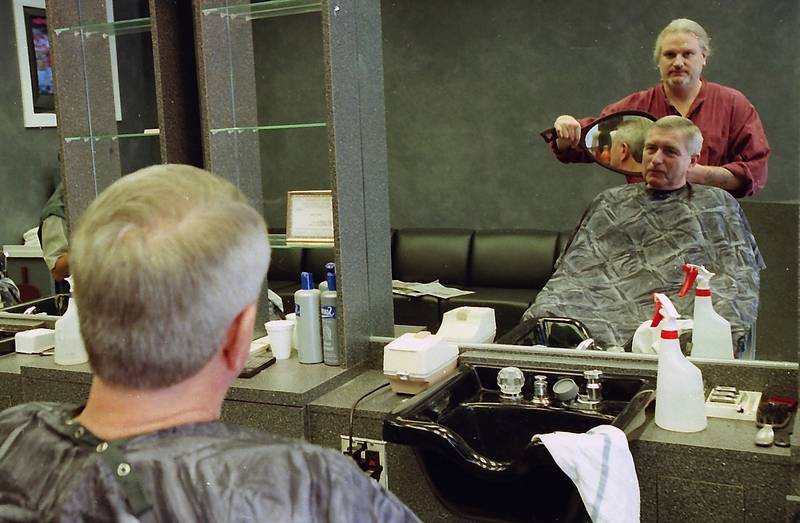
Daily Herald File Photo, 2001
Corey Hindes, at his barbershop shortly after he moved it to the Arlington Plaza where it is today at 130 E. Rand Road, Arlington Heights.
Sonenthal, appearing early, was the first to greet the family.
"I've got some plans (for the shop)," Patty confided. "Could you hold on?"
He knew that in the transition, the shop would lose customers for a variety of reasons, at least temporarily. For one, Corey had had a large personal clientele and already, some of those customers had come by but didn't venture into the shop once they learned the news. Sonenthal knew that if he left, a percentage of his following would go with him too.
"I'm with you all the way," he told Patty. "I'm not leaving until you lock the door."
Corey Hindes for so long had been the life of the shop. He derived much of his identity from it, but likewise, the shop derived its identity from him.
As with any barber, he had his regulars, his signature clientele, customers drawn to him alone by cutting style or personality or simply force of habit.
But even the customers who walked past to the other chairs or to whatever chair happened to be open were charmed and comforted by his presence, his affable nature, his disarming laugh and nasal banter, even by his ever-changing and sometimes unconventional fashion.
At a brawny 6-foot-4, he for the most part did not look like a traditional barber. He flaunted tattoos that sometimes were exposed but at other times were covered by sleeves; long hair that varied in style, at times tied in a ponytail; a chin that could be wrapped in a full heavy beard or highlighted by a goatee or occasionally clean shaven.
His styles were always changing. What he looked like was whatever he was evolving to be at the moment. Sometimes wild, sometimes conservative, sometimes shaggy, sometimes trim. Sometimes absolutely GQ.
Whatever his look, he presented himself with candor and ebullient smiles, certainly without self-consciousness or apology. In doing so, from the customers' perspectives, he cast a certain sense of laid-back freedom over the shop, much as bikers ride with a sense of laid-back freedom on the roads.
"He wasn't really what you thought by looking at Corey," says closest friend Larry Schwartz of Palatine. "He never really disliked anybody. He was like a puppy. He was a greathearted person, and he touched a lot of people's hearts."
Into its fifth decade, the shop is something of an institution in Arlington Heights, although for its first quarter century, a largely hidden one. It originally was called Northpoint Barber Shop, when barbers Lorenz "Larry" Gruber and Paul Grundmann opened it in 1973 in what were then heralded as the "Down Under Shops" carved out in subterranean space below the Northpoint Shopping Center back when that strip mall was fresh and relatively new.
That year, Corey was a mischievous 11-year-old, still playing with Matchbox cars and Hot Wheels in Medinah, captivated by the Cubs and Blackhawks at a time when both excited fans with legitimate but unrequited title hopes, fascinated by anything motorized that would move, the youngest of three brothers, always testing his limits.
His mother was a nurse. His dad was Mike Hindes, still remembered by old-timers around Arlington Heights from his years at Neuman's Barber Shop at 11 E. Campbell St. in the village downtown.
In 1975, Grundmann and Gruber bought that shop too, renaming it First Arlington Barber Shop.
First Arlington was, in fact, an iconic shop in town that operated for 89 years before closing a year ago. It was there that Corey was introduced to barbering.
His dad frequently had him tag along to the downtown shop. Mike cut hair while Corey rubbed elbows with the barbers and customers and swept the floors in exchange for baseball cards and soft drinks.
"So what are you going to do with your life?" his dad asked one day, shortly before or after Corey got out of Lake Park High School in Roselle.
He'd been something of an untamed teenager and outwardly at least, hadn't seemed to have given his future much thought. But even then, he was a social animal and the people aspect of barbering attracted him.
"I guess I'll go to barber college," he said.
As matter of factly as that, Corey, as a teenager, decided in a reflex to devote his life to it.
"He would take the Metra into Chicago and a bus up Milwaukee Avenue to, at that time, the only accredited barber school in the area," his brother Camdon Hindes recalls. "(It was) the first time I saw him that dedicated to anything. It didn't hurt that he was good at it and liked it. I think it also allowed him to make friends and talk to people."
Corey raced through barber school in 11 months and Gruber hired him on at Northpoint.
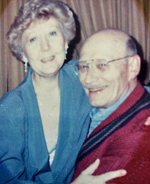
A widow's advice: Embrace bereavement, don't avoid it. A Straight From the Source story.
By 1990, Gruber had assumed sole ownership of the shop, now moved upstairs to the second floor but still hidden away near the bank. He was looking to sell.
Corey was intrigued by the opportunity. "Go big or go home," he liked to say.
The family thinks his mother loaned him the money for the down payment. At age 28, he was running his own shop and inviting his venerable father to help out with one of the chairs.
From the beginning, it was a great adventure, and he loved it with schoolboy enthusiasm. He loved cutting hair. He loved the interaction. He loved being witness to his customers aging and creating families and eventually bringing their kids and grandkids for haircuts.
"You really get to know the people," he told Daily Herald columnist Kim Mikus.
But the location was isolated from Northpoint's foot traffic.
"We have to move or we're going to die," he said. "We can't grow until we get out."
Once he found the spot at Arlington Plaza, he never hesitated, never worried, never second-guessed.
"When he had a hope or a dream or a goal," Patty remembers, "he was always positive."
He moved the shop to 130 E. Rand Road in Arlington Plaza in 2001 and spent hours doing much of the build-out himself.
"He hand-picked everything," stepson Brad Boyer says. "All I remember was his excitement."
"He built the walls, he tiled the floors," son Connor remembers.
"There's a touch of Corey in almost every wall in the shop," stepdaughter Jenessa Donnellan says.
Along with the move, he unveiled a new name for the shop with white lettering in the window: North Arlington Barber Shop, then added Corey's, sans serifed in red neon above it.
To some degree it was redundant. The customers had thought of the shop as Corey's long before the sign was added.
Inside the door, he mounted a flamboyant poster of a white Harley-Davidson Heritage Springer under a faux street sign, Chopper Blvd.
In the summers, he usually drove one of his motorcycles to work and left it parked on the sidewalk outside the barbershop window.
His celebration of motorcycles was happy and overt, and no regulars to the shop lacked an understanding of his devotion to them.
As Connor got older, Corey asked whether he would be interested in joining him at the shop: "I've got a seat for you."
"No, Dad, never in my life," Connor replied.
Connor's a committed drummer and plays with a classic rock band in the area called Peacebloom. He was intent on making a go with it.
"I didn't want to cut hair," Connor says. "I was trying to find something a little different because I didn't want to do the same thing."
Corey asked about barbering but never pushed it. In fact, he had given Connor his first drumsticks and encouraged his musical aspirations.
For Connor's part, he hasn't given up on music. It's possible, after all, to play in a band and work a job at the same time.
But he has changed his view on becoming a barber.
"I'm really enjoying it a lot," he says of barber school. "It's a good gig. I like talking to new people, getting to know their problems and all."
The shop, meanwhile, has come a long way since the challenges brought by Corey's death.
In addition to recruiting and hiring two new barbers, Patty's worked with the staff to strengthen the promotion, on social media, the web and through traditional media like flyers and signage.
Ultimately, she and the family credit Sonenthal, Jordan and Adderley with sustaining the shop.
"Thank God, I found Asha and Trevor and I've got Barry," Patty says. 'They're good people."
They, in turn, credit her.
"She knows what she's doing," Jordan says. "She's caught on very quick."
"We're like a family," Adderley says. "She puts herself in your shoes."
"If Corey was looking down at us," Sonenthal says," I'm hoping wherever he is, he's saying, 'Thank you for what you're doing.'"
For Patty Hindes, taking on the shop had been a formidable and frightening challenge.
"At first, I didn't know what to do," she says. "But I felt there's got to be a way."
"Go big or go home," Corey used to say.
She echoes the expression in tribute to him, thinks even about making it into a tattoo.
But it's more than a remembrance of her lost spouse. It is a commitment. To him. And to herself.
The shop abides.
Go big or go home.